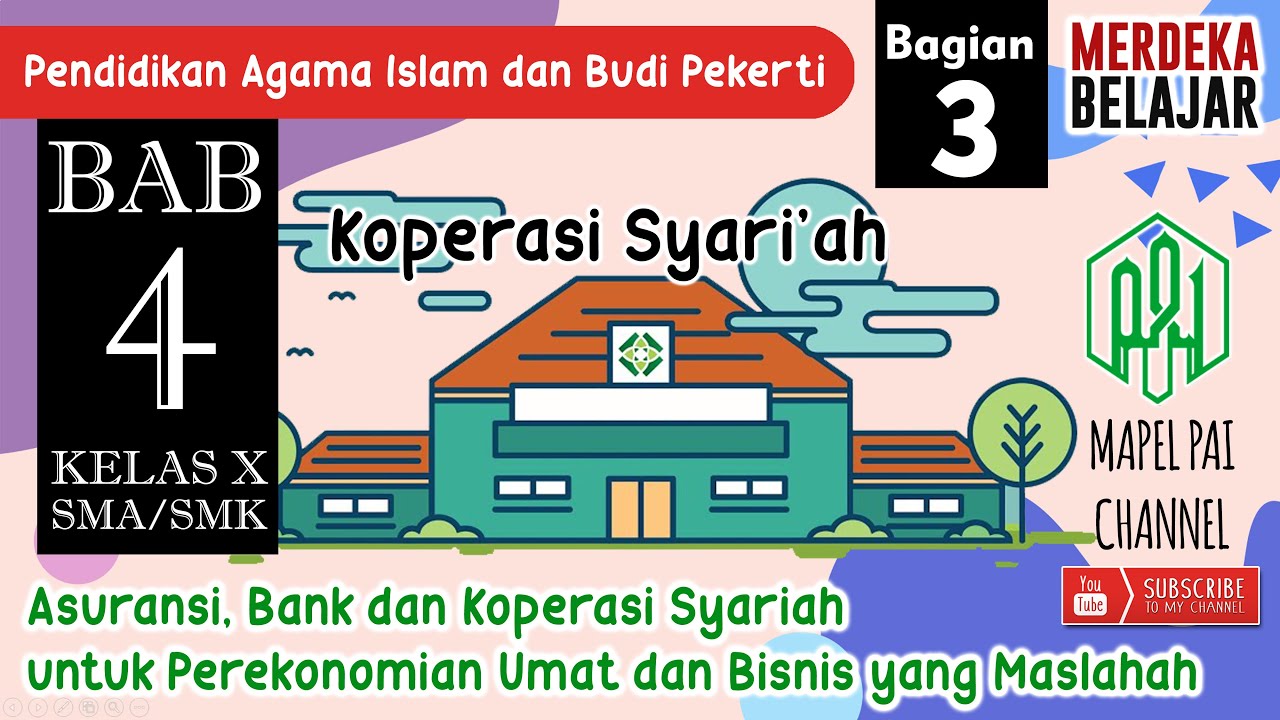VIDIO PEMBELAJARAN POWTOON TERINTEGRASI NILAI-NILAI KEISLAMAN MATERI KOPERASI UNTUK SMA/MA
Summary
TLDRThis video script delves into the concept of cooperatives (koperasi), exploring their historical development globally and in Indonesia, and their role in society. It covers the definition, principles, and goals of cooperatives, highlighting their democratic, family-oriented nature and their non-capitalist, self-reliant structure. The script also addresses the Islamic perspective on cooperatives, outlining their foundation in mutual assistance and shared responsibility. Additionally, it discusses various types of cooperatives such as savings and loan, production, and service cooperatives, and concludes with an evaluation to test viewers' understanding of the material.
Takeaways
- 😀 The session starts with a greeting and a prayer for blessings and understanding in the learning process.
- 😀 Cooperatives (koperasi) originated in Scotland, England, and France, and now exist globally. In Indonesia, they were initiated by Raden Aria Wiraatmaja and further developed by Budi Utomo.
- 😀 A cooperative is a business organization founded on mutual assistance, voluntary membership, and democratic governance, as outlined in Indonesian law (Law No. 25 of 1992).
- 😀 In Islam, cooperatives align with the concept of Syirkah (partnership), which involves shared responsibility and benefits, making it a permissible business model.
- 😀 The foundations of cooperatives are based on Pancasila (the five principles of Indonesia) and the 1945 Indonesian Constitution, emphasizing solidarity and family values (kekeluargaan).
- 😀 The goal of cooperatives is to improve the welfare of its members and contribute to a democratic and just national economy.
- 😀 Key characteristics of cooperatives include voluntary membership, democratic control, non-capitalistic focus, and self-sufficiency based on principles like Swadaya (self-reliance).
- 😀 Cooperatives play an essential role in the economy, including providing financial support to members through loans or other services.
- 😀 There are various types of cooperatives, including savings and loans cooperatives, production cooperatives, consumption cooperatives, marketing cooperatives, and service cooperatives.
- 😀 Islamic values emphasize cooperation, mutual aid, and fairness. These values align with cooperative principles, as seen in hadiths promoting ethical business and solidarity.
- 😀 The session concludes with a quiz to evaluate understanding of the key principles, functions, and Islamic perspectives on cooperatives.
Q & A
What is the main focus of the lesson in the provided transcript?
-The lesson focuses on explaining the history, principles, functions, and types of cooperatives, as well as their relation to Islamic values.
What is the significance of the prayer at the beginning of the lesson?
-The prayer at the beginning seeks blessings and guidance for acquiring knowledge, invoking Allah for understanding and wisdom, and ensuring that the lesson brings positive outcomes.
What historical context is given for the development of cooperatives?
-The development of cooperatives began in Scotland, then spread to England and France. The international cooperative body, International Co-operative Alliance (ICA), was founded in 1895.
How did cooperatives first emerge in Indonesia?
-In Indonesia, the growth of cooperatives was pioneered by Raden Aria Wiraatmaja Patih in Purwokerto, who established a cooperative focused on savings and loans. This was followed by Budi Utomo promoting cooperatives for household needs.
What does the term 'cooperative' mean in the context of this lesson?
-The term 'cooperative' comes from the words 'ko' (together) and 'operation' (effort), referring to a business organization where members collaborate for mutual benefit. It is a collective economic movement based on cooperative principles.
How is the concept of 'syirkah' related to cooperatives in Islam?
-In Islam, cooperatives are seen as a form of 'syirkah,' which refers to a partnership where two or more individuals contribute resources with the understanding that profits and losses will be shared based on agreed terms.
What are the fundamental principles of cooperatives outlined in the lesson?
-The fundamental principles include voluntary and open membership, democratic control by members, economic participation, autonomy and independence, education and training, and concern for the community.
What are the key characteristics of cooperatives as mentioned in the transcript?
-Cooperatives are characterized by voluntary membership, democratic decision-making, family-like relationships, non-capitalistic profit distribution, and reliance on self-sufficiency principles.
What role does cooperative participation play in the community, according to the transcript?
-Cooperative participation helps strengthen the local economy, supports sustainable development, and promotes the welfare of the community by fostering collaboration and mutual assistance among members.
How does Islam view cooperatives in terms of economic collaboration?
-Islam views cooperatives positively, as they align with the principles of mutual aid ('ta'awun'), equity, and fairness, with an emphasis on avoiding exploitation and ensuring that the benefits are shared justly among all members.
Outlines

このセクションは有料ユーザー限定です。 アクセスするには、アップグレードをお願いします。
今すぐアップグレードMindmap

このセクションは有料ユーザー限定です。 アクセスするには、アップグレードをお願いします。
今すぐアップグレードKeywords

このセクションは有料ユーザー限定です。 アクセスするには、アップグレードをお願いします。
今すぐアップグレードHighlights

このセクションは有料ユーザー限定です。 アクセスするには、アップグレードをお願いします。
今すぐアップグレードTranscripts

このセクションは有料ユーザー限定です。 アクセスするには、アップグレードをお願いします。
今すぐアップグレード5.0 / 5 (0 votes)






